Physical Address
304 North Cardinal St.
Dorchester Center, MA 02124
Physical Address
304 North Cardinal St.
Dorchester Center, MA 02124
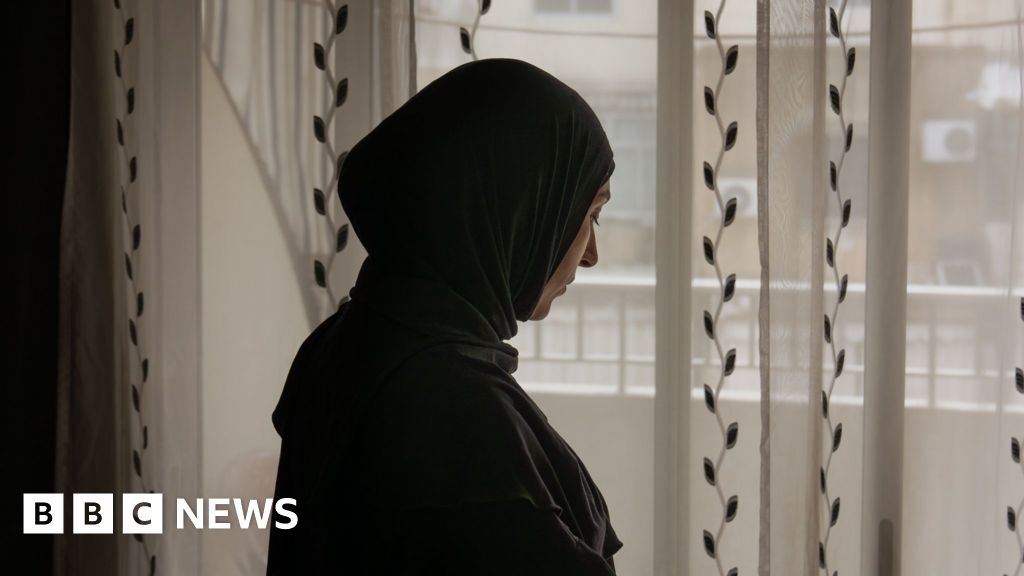
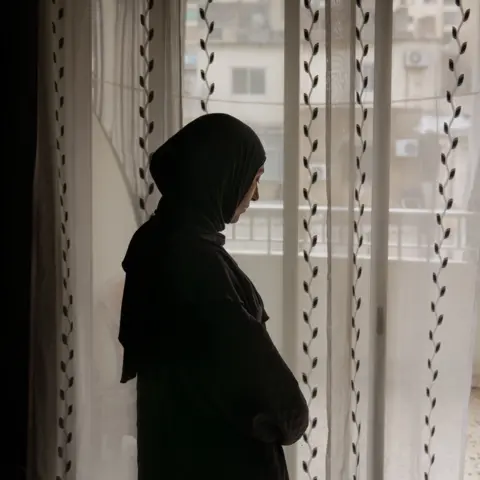 BBC
BBCRihab Faur ran away from home. Then she ran away again. Then the third time. Then the fourth. And the fourth time, a year after the first, she fled from Israeli bombs for so long that she did not feel safe anywhere in Lebanon.
Her journey had begun in October 2023, when Hamas attacked Israel. This prompted the Lebanese political and militant group Hezbollah to fire rockets into Israel and Israel to retaliate by bombing southern Lebanon.
Israeli bombs fell close enough to the village of Rihab that the 33-year-old woman and her husband Saeed, an employee of the municipal water supply company, collected their daughters Tia, 8, and Naya, 6, and fled to Rihab’s parents’ home in Dahieh. , a suburb of the capital Beirut.
Life went on pretty much as usual in Dahih for a while, except that Naya and Tia missed their friends, their beds, their toys, and all the clothes they had left behind.
What they missed most was going to school, which had been replaced by online learning. They were thrilled when Rihab welcomed them to a new school in Beirut in August and took them to buy brand new school uniforms.
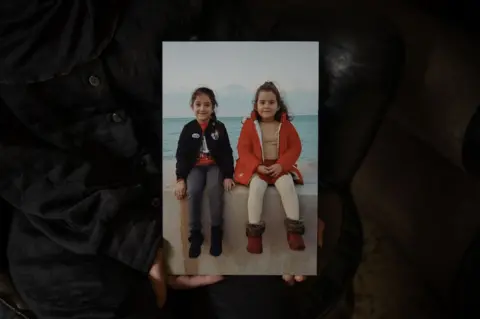 Joel Gunther/BBC
Joel Gunther/BBCBut before their first day could arrive, Israel expanded its bombing of Lebanon to include parts of Beirut, especially the suburb of Dahieh, which the family now called home.
Israel killed high-ranking Hezbollah figures in the suburb, but used large, bunker-busting bombs, each capable of destroying a residential building. In some strikes, Israel dropped dozens of these bombs in one go and flattened entire city blocks.
So the Faure family packed up and fled again, this time to a rented house in another Beirut neighborhood, Djna. After a heavy airstrike in Jinnah, they moved to Saeed’s parents’ house in the neighborhood of Barbora. There they lived with 17 others in one house – people crowded people.
However, Tia and Naya, now nine and seven, had the rare joy of being surrounded by their cousins day and night. So much so that even when Rihab’s father, a retired Lebanese army sergeant, found a rental apartment for just four in the Basta neighborhood, the girls didn’t want to go.
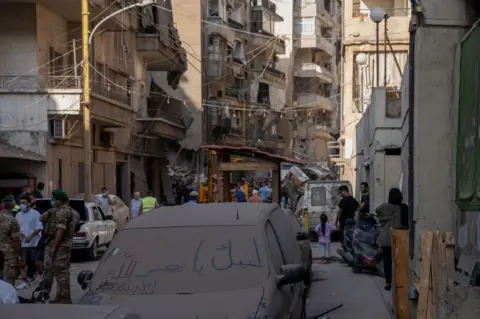 Joel Gunther/BBC
Joel Gunther/BBC“Naya asked us to stay there with the whole family,” Rihab recalled. “We told her we just need to go to sleep in this new house and then we’ll go right back to the family and all the kids.”
And she offered the girls a bargain – come stay overnight in the new apartment and you’ll be able to choose your own dinner. So on the way home, they stopped for fried chicken and other delicacies from a convenience store, and at about 7:30 p.m., when the streets were still full of people, the family pulled up to a dilapidated building in Bast in downtown Beirut.
As recently as 2006, during the previous Israel-Hezbollah war, bombing was carried out only in certain areas of Lebanon – the south, Dahiyeh and some infrastructure facilities. This time, as senior members of Hezbollah spread across the country, Israel bombed them wherever they went.
The bombs were thus delivered to locations previously considered safe, including parts of downtown Beirut.
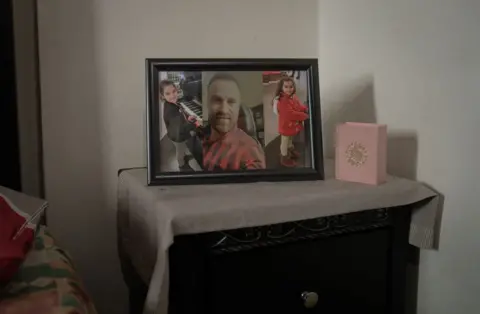 Joel Gunther/BBC
Joel Gunther/BBCNone of this bothered Tia and Naya as the family unloaded their belongings into their new apartment. For now, the girls were more concerned with getting back to their cousins as soon as possible.
Unlike Saeed’s parents’ house, Basta’s new apartment had running water and an electricity generator. The girls were happy to see that the family finally had their own space. Rihab and Syed relaxed a bit. An Israeli drone would likely have buzzed overhead, but the sound over Beirut had become so common that it could be tuned out.
Rihab placed the food and treats on the table. “We sat down to eat and talk and laugh,” she said. “And that was it, my last memory of them.”
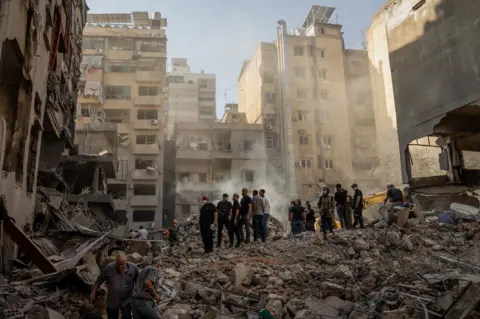 Joel Gunther/BBC
Joel Gunther/BBCBall was a USA made Jdam. It crashed into the building on October 10 at about 8:00 p.m., half an hour after the family arrived. It flattened all three floors and destroyed parts of adjacent buildings and cars, and killed 22 men, women and childrenmaking it the deadliest strike in central Beirut since the fighting began a year earlier.
The Israeli military gave no warning before the strike, so the building was full of people. Israel reportedly targeted Wafiq Safa, head of Hezbollah’s coordination and communications unit, but Safa was not reported to be among the dead. He had either survived or she wasn’t there to begin with. The IDF declined to comment on the strike or the lack of warning before it.
Rihab woke up in Beirut’s Zahraa Hospital unable to move. Her back and arm were badly injured and she required at least two surgeries. She drifted in and out of consciousness. Everything between laughing with her daughters at dinner and waking up in the hospital was a blank in her mind.
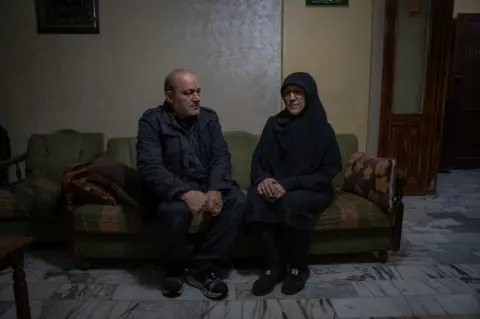 Joel Gunther/BBC
Joel Gunther/BBCAs she slept that night, her family searched Beirut’s hospitals. By midnight, they learned that Saeed and Tia were dead. DNA tests will be required to confirm that Naya was killed, along with another girl her age who was taken to the same hospital, as their injuries prevented them from being openly identified.
Rihab’s doctors advised her family not to tell her about it. They were worried that while still awaiting major surgery, the news would be too much for her. So for two weeks, when she underwent surgery and then recovered from the surgeries, her mother Basima consoled her that Saeed and the girls were being treated in different hospitals.
But Rihab sensed something was wrong and started insisting to see pictures and videos of the girls. “She felt it in her heart,” Basima said.
Eleven days after the strike, a DNA test confirmed that Tia was dead, and on the 15th, Rihab was told by a hospital psychiatrist that Saeed and the girls were gone.
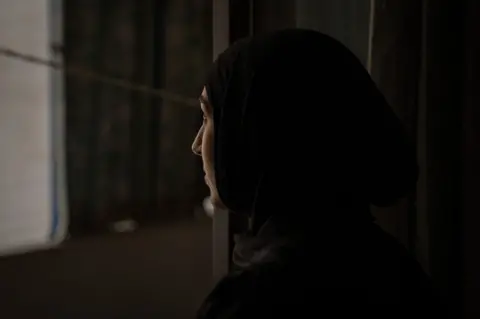 Joel Gunther/BBC
Joel Gunther/BBCSix weeks later, Rihab sat in a hard plastic chair in an apartment in Beirut, her eyes dark and her face drawn. She was still recovering from the operations – eight screws were fixed in her spine and three more in her arm. She had been sleeping for a long time, and now she tried to sit up more and walk a little, although every movement caused her pain.
Naya’s eighth birthday was four days early. Rihab spent the time “crying or sleeping,” she said. But she wanted to talk about her family.
“Naya was very attached to me, she followed me everywhere I went. Tia loved her grandparents and was happy if I left her with them. Both girls really liked to draw, play with toys, they missed going to school. They played teacher and student together for hours.
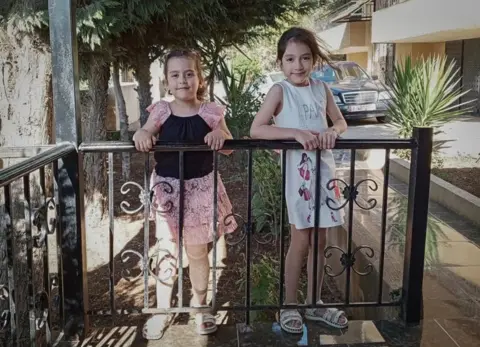
Above all, they enjoyed watching videos together on TikTok. Rihab and Syed felt they were still too young to post their videos online, so Rihab filmed them dancing and playing and told the girls he was posting them on the app, which seemed to satisfy them.
Saeed had entered Rihab’s life in 2013. Rihab grew up in Beirut, but her family visited the village of Mays El Jabal in the summer because of the cooler air and the countryside surrounding the village, and that summer she met Said through. mutual friends.
Rihab completed her undergraduate law degree and began studying for a master’s degree, but the couple got engaged and then married, and Tia was soon born, putting Rihab on hold in her budding legal career.
Now, in the midst of her loss, she has tentatively started thinking about her studies again. “I’ll need something to fill my days,” she said.
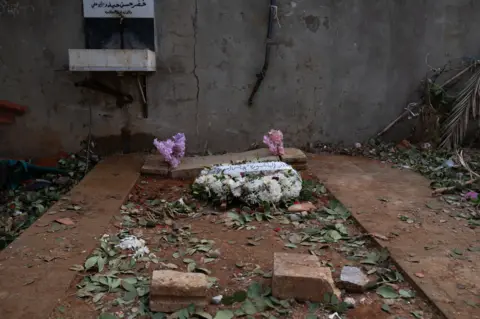 Joel Gunther/BBC
Joel Gunther/BBCThe day after his death, Rihab’s father and uncles buried Said and Tiya in makeshift wooden coffins in an unmarked grave in Dahih. Two weeks later, the men of the family dug again in the same place and buried Naya. Rihab’s uncle placed two sprigs of artificial cherry blossoms at the head of the two girls’ graves, and later someone else placed a wreath next to a stranger buried next to them.
An Israeli airstrike then hit a building right next to the cemetery, causing a blast wave and debris to smash the tombstones and pulverize the ground around them. Around the same time, another Israeli airstrike hit the family home in Dahih, destroying several items that Rihab had wanted to keep, including two new, unworn school uniforms.
Not long after that it was all over. Last week’s ceasefire allowed thousands of displaced people to return to their villages in southern Lebanon. Rihab and Said’s village was heavily bombed by the Israelis and their family home was destroyed, her uncle said, but Rihab still can’t return home because she will be on her back and unable to travel for months.
As joy spread across Lebanon at news of the ceasefire, new images emerged of Wafiq Safa, the target of the bomb that killed Saeed, Tea, Naya and 19 others. Safa has not been seen in public since the strike, but appears to be alive and well.
Additional reporting by Joanna Mazjoub